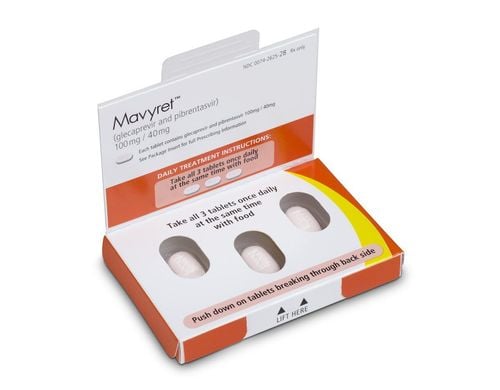This is an automatically translated article.
Lamizido belongs to the group of antiparasitic, anti-infective, antiviral and antifungal drugs. It is indicated for the treatment of active chronic hepatitis B. Let's find out what Lamizido uses in the article below.
1. What is Lamizido?
Lamizido medicine contains ingredients Lamivudin 150mg, Zidovudin 300mg and other excipients just enough for 1 tablet. The drug is prepared in the form of film-coated tablets, box of 3 blisters, each blister contains 10 tablets.
2. What are the uses of Lamizido?
Lamizido is indicated in the following cases:
Treatment of chronic hepatitis B in patients 16 years of age and older with evidence of hepatitis B virus (HBV) replication and progressive hepatitis development of one or more conditions such as: serum Alanine aminotransferase (ALT) 2 or more times normal, cirrhosis, decompensated liver disease, biopsied necrotizing inflammatory liver disease, lesions immune system and liver transplantation. In addition, Lamizido drug is contraindicated in the following cases:
Patients are allergic to active ingredients Lamivudin or Zidovudin and other excipients in the composition of the drug.
3. Dosage and how to use Lamizido
Lamizido drug is prepared in the form of film-coated tablets, used orally. The drug can be taken with meals or between meals.
Dosage of Lamizido is as follows:
Patients 16 years of age and older:
The recommended dose is 100mg, once a day. In patients with renal impairment with creatinine clearance less than 50 ml/min, the dose should be reduced. Discontinuation of the drug should be considered in cases such as patients with confirmed HBeAg and/or HbsAg seroconversion in immunocompetent subjects, female patients who become pregnant during treatment, patients with signs of drug intolerance during treatment. In case Lamizido must be discontinued, patients should be periodically monitored to detect recurrent hepatitis. For patients with hepatic impairment: The pharmacokinetics of the drug is not significantly affected by hepatic dysfunction, so no dose adjustment is required in patients with hepatic impairment, unless accompanied by renal impairment.
Note: Lamizido dosage above is for reference only. The specific dose of Lamizido depends on the condition and the progression of the disease. To get the right dose of Lamizido, patients should consult their doctor or healthcare professional.
4. Side effects of the drug Lamizido
The doctor always considers the benefit that Lamizido brings to the patient and the possible risk of side effects to prescribe appropriately.
Lamizido is generally well tolerated, side effects are usually mild and transient, usually resolve when treatment is stopped.
Common as fatigue, malaise, respiratory infection, headache, abdominal pain and discomfort, nausea, vomiting and diarrhea. Others may experience effects such as lactic acidosis, severe hepatomegaly and fatty liver disease, exacerbation of the disease after treatment, pancreatitis, the emergence of a mutant virus strain associated with reduced susceptibility. drug sensitivity and reduced response to treatment. If you experience these symptoms, the patient should stop using Lamizido and notify the doctor for appropriate treatment.
5. Lamizido drug interactions
Need to list drugs such as prescription drugs, non-prescription drugs, functional foods, herbs, ... that the patient is using for the doctor to know and give specific advice.
The potential for drug interactions is low due to limited metabolism and binding to plasma proteins and almost complete renal elimination as unchanged drug. The drug is eliminated mainly by the mechanism of active excretion of organic cations. Limit the use of combinations of drugs with the same elimination mechanism as that of Lamizido. Lamizido should not be used in combination with drugs such as Zalcitabine, Ganciclovir and Trimethoprim. To avoid interactions, before being prescribed Lamizido, the patient should inform the doctor about the drugs they are using, including functional foods. The doctor will base on that to prescribe the appropriate Lamizido.
6. Notes when taking Lamizido
Some notes when patients use Lamizido drug as follows:
Be careful when using the drug for subjects such as obese women, liver disease, cirrhosis due to chronic hepatitis B and kidney failure. There may be a risk of lactic acidosis, hepatomegaly and severe fatty liver. Several cases of disease progression that worsened on discontinuation of the drug, which can lead to death, have been reported. Therefore, patients should adhere to the medication prescribed by the doctor and be periodically monitored in clinical practice. During treatment, the patient should be monitored, reviewed and evaluated by a physician experienced in the treatment of chronic hepatitis B. There is no information on mother-to-child transmission of hepatitis B virus in pregnant patients treated with Lamizido. However, it is possible to infect the baby with hepatitis B during birth, so it is necessary to actively vaccinate the baby against hepatitis B virus within 24 hours after birth. Pregnancy: Lamizido should not be used especially during the first trimester of pregnancy, unless absolutely necessary for the therapeutic benefit of the mother. Lactation: Lamizido is excreted in breast milk. Therefore, to limit the potential risk of breastfeeding, the drug should not be used unless directed by a doctor. In case the patient has to take medication for the treatment, breast-feeding can be stopped.
7. What to do in case of missed dose or overdose of Lamizido?
When forgetting a dose of Lamizido, the patient should take it as soon as he remembers. The drug can be taken 1-2 hours apart from the usual time. However, the patient should skip the missed dose if it is almost time for the next dose and do not double the dose if the patient forgets to take the dose. When Lamizido overdose, patients often experience symptoms such as drowsiness, agitation, aggression, impaired consciousness, respiratory depression, tachycardia and coma. The patient should stop taking the drug and notify the treating doctor. Immediately take the patient to the nearest hospital when the condition worsens. Above is all information about Lamizido drug, patients need to carefully read the instructions for use, consult a doctor / pharmacist before using. Note, Lamizido is a prescription drug, patients absolutely must not buy drugs to treat at home because they may encounter unwanted side effects.













